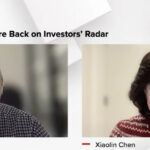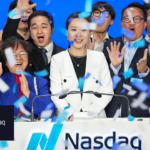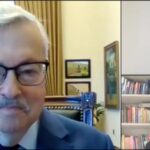
Rhetoric vs. Reality: Trump’s “Man in Beijing” Weighs in on The Future of US-China Relations
As November's U.S. presidential election draws closer, the stakes for the future of the U.S.-China relationship are high. With the race between former President Trump and current President Biden shaping up to be extremely tight, both candidates want to score as many points with voters as possible. One topic popular with both parties is being "tough on China" – but campaign positions often ignore economic realities. China remains our top trading partner by trade intensity1 and top S&P 500 companies derive significant revenue from China. Due to this economic interdependence, we believe separating rhetoric from reality regarding China is paramount for investors.
To cut through the noise, KraneShares hosted a webinar with former U.S. Ambassador to China Terry Branstad, 'Trump's man in Beijing,' and David Adelman, former U.S. Ambassador to Singapore during the Obama Administration. Both diplomats argued that while Trump and Biden are stylistic opposites, their policies toward China are similar. The U.S. will continue its robust economic relationship with China regardless of the election results.
Please note that this discussion occured before the CNN Presidential Debate on June 27th, 2024, which has led to speculation that Biden may be replaced as the Democratic candidate for president on the November ballot.
The Art of the Deal: Sweeping or Targeted?
Branstad and Adelman both believe Trump will quickly look for a sweeping deal with China if elected. Branstad said that during his time in Beijing, President Trump's main goal was for "America to get a better deal," which led to the so-called "trade war," culminating in the Phase One trade deal. Now-candidate Trump is proposing 60% tariffs on imports from China, though Branstad argued that Trump views tariffs as a negotiation tactic to get the "best deal" possible. Branstad described China as his best customer when he was governor of Iowa, one of the largest soybean-exporting states. He noted that the Phase One trade agreement led China to make record agriculture purchases from the United States, though admitted that the onset of the global pandemic stalled progress.
A deal orchestrated by Trump may also include commitments from Chinese companies to create jobs in the US, according to Branstad. He said that Biden’s 100% tariffs on China-made electric vehicles, which effectively cut them off from the US market, were a response to mounting criticism that the president’s emphasis on electric vehicle adoption could create a reliance on China for vehicles due to its strong supply chain advantages. In Branstad’s view, Trump may instead insist that Chinese automakers move final production steps to the US to access the US markets.
While Trump will search for a grand deal, Biden will be more tactical, said Adelman, making small compromises from time to time in a variety of areas. "He will compartmentalize issues, so he will probably deal with trade separately from the other security issues,” said Adelman. Although Biden may have a more hawkish stance on security issues, Adelman thinks he can make progress on trade.
Adelman said many were surprised when Biden increased the tariffs initiated by Trump. According to Adelman, "There has been perhaps the heaviest use of tariffs on trade of goods that we have seen in generations." However, despite Biden's tough stance on China, the U.S-China trade relationship has continued to grow. Adelman added that in 2023, two-way trade of goods exceeded $580 billion.
One Definite Election Outcome – A Second Term President
The 2024 election has a notable caveat; no matter who wins, it will be a second presidential term. According to Adelman, second terms are typically when the "American President tries to make his mark on the world" without the pressure of a reelection campaign. He gave the example of Clinton’s efforts to revive Israel-Palestine peace talks, building on the Oslo Accords of 1993, during his second term. Adelman added that this might "result in an easing of trade tensions and perhaps bolstering a return to a global economy." Adelman expects the candidates to engage in "high-level deal-making," which would help Trump or Biden stamp their mark on U.S.-China relations with a "deal across the Pacific."
Branstad, on the other hand, said that Trump will mostly focus on continuing the agenda from his first term. Fortunately for US-China relations, that includes building upon the Phase One trade agreement, negotiated by Robert Lighthizer. Branstad said he gained respect for Lighthizer while he was ambassador and is excited that Lighthizer could be Trump’s key China negotiator once again. He also mentioned that Lighthizer’s close relationship with former Vice Premier Liu He, who represented China in the trade talks that led to the Phase One agreement, could be an asset in any future negotiations.
Semiconductors, Stability, & Corporate Interests
For both the Ambassadors, the semiconductor industry presents an interesting opportunity for negotiation. While U.S. restrictions aimed to limit China's access to high-end technology, Adelman suggested that they may have inadvertently accelerated China's efforts to develop its capabilities. However, global businesses have found ways to "work around these controls," and China's semiconductor manufacturing sector continues to grow.
According to the Ambassadors, both countries’ need for semiconductors is a strong reason why the status quo will be maintained on Taiwan. Adelman stated that the Biden Administration "has been crystal clear that they have no interest in changing the status quo." Branstad noted that China's President Xi Jinping understands the importance of protecting the semiconductor manufacturing facilities located in Taiwan "as much as the U.S. does."
Corporate perspectives will likely play a significant role in shaping policy. Branstad stated that both Administrations have demonstrated a willingness to engage with business leaders, and this trend could continue. Adelman brought up the APEC (Asia Pacific Economic Cooperation) summit in San Francisco last November as an example. President Xi's decision to address American business leaders in San Francisco on the sidelines of the conference underscores the importance of these relationships. Adelman stated, "he chose to speak to American business leaders undoubtedly part of the charm offensive" and Xi is trying to appeal to corporate leaders who may have more sway in the White House. Branstad agreed, saying "I think he (President Xi Jinping) realizes that he needs American businesses to invest in China."
Adelman explained that both countries have a vested interest in each other's economic success despite ongoing competition in the security and geopolitical spheres. As Branstad put it, “the American consumer appreciates the affordability and quality of Chinese goods, and the Chinese consumer appreciates the reliability and quality of American goods.”
The Future of TikTok
The discussion also touched on the future of TikTok and technology. Branstad highlighted the extensive popularity of the platform and that it is many people's "primary news source," specifically among young people. He implied that this reality will shape the eventual outcome of the current legislation.
Adelman noted the profound impact of TikTok in the U.S. and anticipated a compromise that would allow its continued operation. "Campaigns up and down the ballot are using TikTok," said Adelman. The recently passed Bill titled the "Protecting Americans from Foreign Adversary Controlled Applications Act" was a legislative package that also included aid packages to Ukraine and Israel. Adelman added that if the TikTok ban had been a standalone bill, it may not have passed. While ByteDance is mandated to divest from their U.S. division of TikTok, they currently have no plans to sell and have appealed the decision. Trump recently voiced his support for TikTok, describing the platform's popularity as too extensive to ignore.
Conclusion
We were honored to have Ambassador Terry Branstad as a guest speaker and discuss his thoughts with our own General Counsel, Former Ambassador David Adelman. Both Ambassadors agree that the recent increase in hawkish rhetoric is more of a feature of the campaign trail than an indication of a policy shift. Biden’s recent 100% tariffs on China-made electric vehicles is a prime example of this. They also agree that, as second-term presidents, both candidates will likely pursue new deals with China, though Trump’s approach will be broad-based while Biden’s will be more targeted and tactical.
- Data from the United States Trade Representative for 2023. Trade intensity is defined as the sum of imports and exports.















